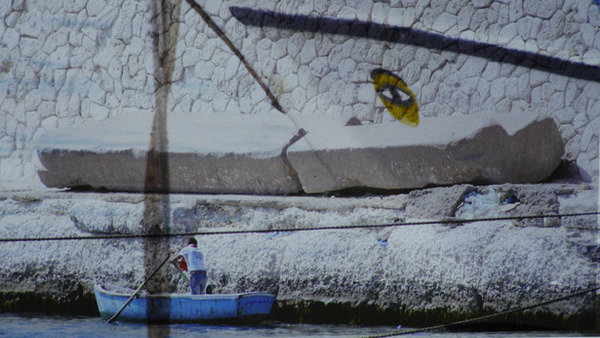Ellie Ga
dal 26/2/2015 al 30/5/2015
Segnalato da
26/2/2015
Ellie Ga
Le Grand Cafe' Centre d'art contemporain, Saint-Nazaire
With a beautiful simplicity, the artist plays with the narrative structure of story and leads her audience on a captivating textual and visual inquiry, loaded with strata and serendipity.

Curated by: Sophie Legrandjacques
Ellie Ga is a part of the line of artists, sometimes described as iconographers, who make “a work of re-membering” the past, and who work with history considered as a forgetful, partial and incomplete material that requires constant present-day reworking to draw new meaning from it.
The artist nevertheless holds herself at a distance from these “room-based” practices in the sense that she goes back to the field of perception: her projects, which are always elaborated over the long term, manifest an impressive faculty for immersion that informs her life as much as her work. By turns historian, explorer, archaeologist and essayist, Ellie Ga carries out different scientific researches and fieldwork with the aim of discerning the interstices and lacunas occurring in the porous structure of history. Her installations and performances intersect, continually oscillating between averred historical fact and fabulous conjecture. We could therefore argue that the most adequate description of her approach would be the essay form—a flexible and experimental work in which ideas are drawn as much from the scientific field as from the poetic and in which the author does not pretend to have exhausted the subject.
She was already engaged in several investigative and collecting activities when, in 2007, she began to attract attention. Prior to boarding Tara, a research vessel locked in the ice near the North Pole for a five-month Arctic expedition, Ellie Ga was invited as artist in residence at the Explorers Club in New York to work with the archives and the collection. For over a year she tracked down the missing pieces of the first-ever expedition to the North Pole, revealing the divergences between the explorers’ concern with documenting a then-unknown territory, the work of archivists conserving the remains of the expedition, and the poetic approach of the artist as explorer. Paying attention to details and anecdotes, this research resulted in a unique tale in images (The Catalogue of the Lost) and a performance. Titled The Fortunetellers, this latter incorporated a large group of documents (photographs, videos, annotated diagrams, maps, travel journals) and aggregated biographical elements and scientific lectures, environmental speculations and the rituals of everyday life in the obscurity of the Arctic night.
After these months spent in darkness, Ellie Ga became interested in the island of Pharos and its “tower of light,” the lighthouse of Alexandria, considered to be the Seventh Wonder of the Ancient World. This Greek monument, built in the 3rd century BC, was described in terms both laconic and geometric: a rectangular tower rising from an octagonal base and topped by a cylindrical beacon. The lighthouse seems to have been destroyed by a series of earthquakes, but remained until the 14th century and was abundantly commented on thereafter. Once again, Ellie Ga explores less what the archive contains than what is missing and contradictory. Throughout the winter of 2012, she joined a marine archaeology programme at the University of Alexandria and began a kind of “drifting research” across the modern city, in archives and libraries and in the underwater ruins. Out of this came the vast constellation of works being presented in the solo exhibition dedicated to the artist by Le Grand Café art centre: Carré Octogone Cercle (Square Octagon Circle).
With a beautiful simplicity, the artist plays with the narrative structure of story and leads her audience on a captivating textual and visual inquiry, loaded with strata and serendipity. She could be a knowledgeable bore, but instead she is spontaneous and open to the unexpected—an essayist who leaves a lot of room for invention, a precious common point between the researching academic and the creating artist. In a past that is both ridden with gaps and over‑documented, where its interpretation and its memory often appear locked up in the imperfections of language, Ellie Ga’s work liberates the circulation of meaning.
Image: Ellie Ga, Four Thousand Blocks (still), 2013. Video. © Ellie Ga.
Press Contact:
Rémy Albert, stag_gdcaf@mairie-saintnazaire.fr
Opening: Friday 27 February, 18.30h
Le Grand Café, Contemporary Art Centre, Saint-Nazaire
Place des Quatre z’Horloges
44600 – Saint-Nazaire
France
Hours: Tuesday–Sunday 14–19h,
Wednesday 11–19h
Free admission



